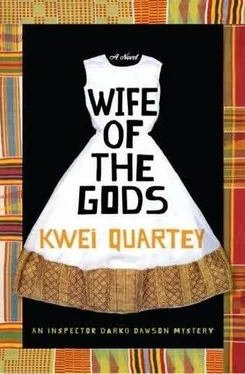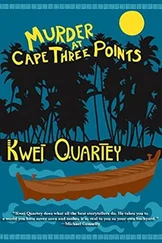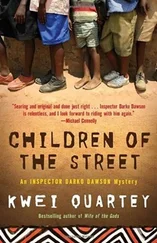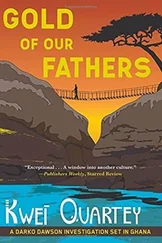“It’s a million times better than okay. A huge relief, really-one less thing to do.”
“Consider it done, then.”
“Thank you, Doctor. For everything.”
“You’re most welcome, Inspector Dawson. If there’s anything I can help you with, please don’t hesitate to call. Good luck, and drive safely.”
To get to Ketanu from Akosombo, Dawson went south again to Atimpoku and took the Adomi Bridge across the Volta River. He fiddled with the radio dial until he found a station playing hip-life music-something to keep him company for the hour-long journey. Much of that time was taken up by slowing at police checkpoints. Togo, Ghana’s neighboring country, was not far away, and as Dawson knew only too well, the Volta Region was a hub for illicit drugs going back and forth across the border.
No drug-sniffing dogs at the checkpoints, thank goodness . Dawson had a little marijuana on him, and though his CID badge would get him easily past the human police, nosy canines were another matter altogether.
Traffic was light up to Ketanu. Along the road, pedestrians trudged between one town and the next, and not for the first time, Dawson marveled at the stamina of even small children carrying firewood or buckets of water on their heads.
By the time he reached Juapong, he was good and hungry and kept thinking about Dr. Biney’s alluring invitation to dine on grilled tilapia. Dawson would have to settle for something gastronomically simpler, and he pulled over to buy golden-roasted plantain and groundnuts from a roadside trader.
On the way again, Dawson noticed how the vegetation began to change from open bush with isolated skyscraper trees to denser semi-deciduous forest, but that in turn gave way to buildings as Dawson approached Ketanu. He passed a sign announcing YOU ARE ENTERING KETANU and slowed down over the brain-rattling speed strips.
If Ketanu had been an impressionist painting, it would have been dots and daubs of tan and brown. Buildings were a cream color or darker, and the rusted tin roofs exactly matched the color of the ground. Tro-tros and taxis plied the streets, and shops and trading kiosks lined the roadside with entertaining appellations like Nothing but Prayer Electrical Goods and the God Is Great Hair Clinic. Dawson loved these names.
He was looking for something recognizable from long ago, but nothing familiar had struck him so far. Even the road he was on was newly constructed and not the same one he had traveled with Mama and Cairo.
Dawson was to meet an Inspector Fiti at the police station. The directions were in his head. He turned right onto a fitfully paved road, drove slowly up a small incline, and pulled up to a small, stand-alone square building painted the signature dark blue with the words GHANA POLICE SERVICE-KETANU across the top in white.
Before the entrance itself, there was a small covered veranda, where three people were seated on a wooden bench. As he walked in, Dawson saw a counter at the front with space to fit no more than two people behind it. To his left, down a couple of steps, were two small jail cells, and to his right was an office whose door was shut.
Two constables in the standard GPS gray-and-black camouflage-like uniform were behind the counter doing some paperwork. The younger, round-faced one, who looked to be in his mid-twenties, looked up inquiringly.
“Good afternoon, sir. You are welcome.”
“Good afternoon. I’m Detective Inspector Dawson, Accra CID.”
The constable stood up even straighter.
“Yes, sir, Inspector Dawson, sir. I’m Constable Gyamfi.” They shook hands. “That is Constable Bubo over there.”
“Good afternoon, sir,” Bubo said, standing up with an acknowledging nod.
“I will let Inspector Fiti know you are here, sir,” Gyamfi said, coming around from behind the counter. He knocked on the closed office door, opened it, and put his head in.
“Please, sir, Detective Inspector Dawson from Accra is here.”
“Who?” Dawson heard the inspector say.
“D.I. Dawson, sir. From CID, sir.”
“From Accra , you say?”
“Yes, sir.”
There was silence for a moment. The door opened fully, and Inspector Fiti emerged. He was probably in his late forties, pointy-faced with a thick neck and sweat rings at the armpits of his olive shirt, which was coming undone from underneath his paunch. He seemed both puzzled and wary as he approached Dawson.
“Good afternoon, Detective Inspector,” he said. “Can I do anything for you?” His voice was coarse and sticky, like freshly laid asphalt.
Now it was Dawson who was puzzled. “I’m here regarding the murder case? Gladys Mensah?”
Fiti looked blank. “I was expecting someone from Ho.”
“I don’t know much about that part,” Dawson said. “All I was told by my chief super was that the minister of health wanted Accra CID to be in charge.”
“Who is your chief superintendent?”
“Theophilus Lartey.”
“Oh, yes. I know him.”
A trim, clean-shaven, baby-faced man had been hovering behind Fiti in the doorway of the office, but now he approached Dawson.
“Welcome, Detective Inspector,” he said, shaking hands. His voice was gentle but resilient, like the sensation of soft, wet grass on bare feet, and his inflection hinted at some significant stay in England. “I’m Timothy Sowah, program director of the Health Service AIDS program in the Volta Region. Gladys Mensah was doing volunteer work with us. She was the best. These past three days have been horrendous.”
“Excuse me one minute,” Inspector Fiti said brusquely, returning to his office and shutting the door.
“He doesn’t seem very happy I’m here,” Dawson said, lowering his voice.
Timothy made a face. “No, he doesn’t.”
Seconds later they could hear Fiti on the phone asking someone at the Ho station what was going on.
“Can I have a word with you outside?” Timothy said to Dawson.
They stepped out.
“Don’t let this on to Inspector Fiti,” Timothy said, “but I had a lot to do with your being here instead of the chap from Ho.”
Dawson was surprised. “You did?”
“Yes. Look, I was worried. I wanted to be sure we got someone really good on the case. I know the CID chap stationed at Ho, and I’m sorry, I’m not impressed. I couldn’t take the risk. I really want this murder solved. So I called the minister, and he agreed to have Accra handle it. So here you are. Trouble is, I’m sure everyone thought everyone else was going to inform Inspector Fiti, and so it ended up no one did. I apologize if I’ve caused a bit of an incident.”
“It’s all right,” Dawson said. “At least now I’m clear how it happened.”
“Let’s go back inside.”
Inspector Fiti had emerged from his office again. “Accra CID is always doing this,” he said bitterly. “They think we can’t handle our own affairs.”
“I’m sorry to have caught you unawares, Inspector,” Dawson said. “I’m here to help, that’s all.”
Fiti heaved a sigh. “Okay. Anyway, you can come into my office.”
It was small and jumbled, as untidy as Inspector Fiti himself. Tilting stacks of papers on the desk were gathering dust, and there was more chaos on the floor. There were only two chairs, and Fiti asked Constable Gyamfi to bring in a third. It was hot and airless in the room despite the whirring ceiling fan. Squashed close to the other two men with the door shut, Dawson felt suffocated.
His first order of business was to let Sowah and the inspector know the latest, and he told them about the autopsy on Gladys.
“Strangled,” Timothy said, looking stunned. “Strangled, my God.”
“Do you have the autopsy report?” Inspector Fiti asked.
Читать дальше












